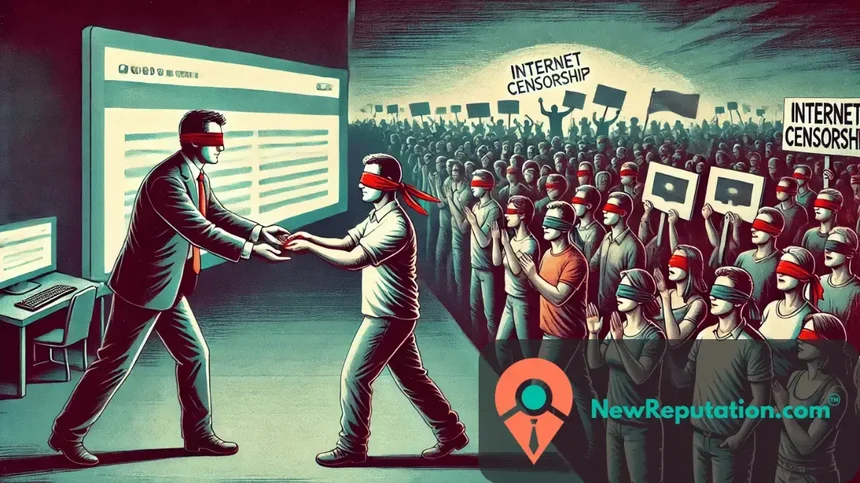Censorship is the act of restricting or suppressing content. It can include information, speech, images, or videos that are deemed inappropriate or harmful by governments, companies, or other institutions. Censorship is often used to block access to certain websites, remove harmful content, or limit discussions.
The topic of internet censorship is controversial. While some argue it is necessary to maintain order, others believe it infringes on free speech. As more of our lives move online, the debate about censorship has become more important.
Types of Internet Censorship
There are several ways that censorship is enforced on the internet. Here are the main types:
- Content Blocking: Specific types of content are made inaccessible. Governments or internet service providers (ISPs) may block specific domains, URLs, or keywords. This can prevent access to illegal or harmful content and restrict free expression.
- Content Filtering: ISPs or platforms use automated tools to filter out content that contains specific words or phrases. For example, social media platforms may use filters to remove offensive language or images.
- Takedown Requests: Governments or private organizations can request that content be removed. This often happens if the content violates laws or platform policies. For example, platforms like Facebook or YouTube may remove content that incites violence or spreads misinformation.
- Throttling: Throttling is when ISPs slow down access to certain websites or services. This can make it harder for people to use specific platforms. This method can be used to enforce censorship without completely blocking sites.
Pros of Internet Censorship
Internet censorship has its benefits. Below are some of the main advantages.
- Protects Vulnerable Audiences: Censorship helps safeguard children and vulnerable individuals from harmful content. This includes blocking access to adult material, violence, and hate speech. By filtering this content, it creates a safer environment for younger users.
- Prevents the Spread of Misinformation: Misinformation can have real-world consequences, such as influencing elections or spreading fear during crises. Censorship can stop the rapid spread of false information, helping to maintain social order and prevent panic.
- Reduces Cyberbullying and Harassment: Online harassment is a growing issue. By censoring harmful or abusive language, social media platforms can reduce cyberbullying. This helps create a more positive online environment.
- National Security: Censorship can help prevent the spread of extremist content that promotes terrorism or violence. Governments use censorship to protect national security by blocking content that could encourage criminal behavior or incite violence.
- Cultural and Social Harmony: In some countries, censorship protects cultural values. For instance, content that is offensive to certain religious or cultural groups may be censored to prevent social unrest.
- Prevents Harmful Content: Censorship can stop illegal content, such as child pornography, drug trafficking, and the sale of illegal weapons. By filtering such content, authorities can enforce laws and keep harmful materials off the internet.
Cons of Internet Censorship
While censorship has its benefits, it also has some serious downsides.
- Limits Freedom of Speech: One of the biggest concerns is that censorship restricts free speech. In many countries, censorship is used to silence political dissent or unpopular opinions. This can limit public discussion on important issues and undermine democracy.
- Reduces Access to Information: Censorship can restrict access to valuable information. Governments or platforms sometimes block educational content, news, or other resources. This prevents people from being well-informed and limits their ability to make informed decisions.
- Government Abuse: Some governments use internet censorship to suppress opposition and control public opinion. In authoritarian regimes, censorship can be a tool for manipulating the narrative and controlling citizens. This raises concerns about human rights and the misuse of power.
- Encourages Black Markets: When certain content is blocked, it often leads to the rise of illegal means of accessing that information. For example, in countries with strict censorship, people use virtual private networks (VPNs) to bypass restrictions. This creates an underground market for restricted content.
- Hinders Innovation: Censorship can also stifle creativity and innovation. It can limit technological advancements if people cannot access certain resources or express their ideas freely. Open access to information is critical for innovation, especially in the tech industry.
- Costs to Businesses: Censorship can create challenges for companies. Some businesses rely on global platforms like Facebook, Twitter, or Google for advertising or communication. If these platforms are blocked, companies may lose access to key markets, harming the economy and restricting business opportunities.
Key Takeaways
Internet censorship is a complex issue with both benefits and drawbacks. On the one hand, it can protect vulnerable users and prevent the spread of harmful or illegal content. On the other hand, it can limit free speech, access to information, and innovation.
The balance between safety and freedom is difficult to achieve. While some censorship is necessary, too much can negatively affect society. Finding the right approach to internet censorship is a challenge that governments, tech companies, and individuals must address as the internet grows.
Internet censorship will likely remain a topic of debate for years to come. Policymakers, platforms, and users must find ways to navigate this issue without sacrificing fundamental rights.

Kevin Curran is the founder and CEO of NewReputation, a well-known online reputation management firm. He is also the co-founder of ReputationPrivacy, a platform that helps people manage their digital footprints effectively. Kevin has worked with a wide range of clients, including Fortune 500 companies, high-profile executives, and small business owners, to create an authentic online presence that accurately reflects their brand.

